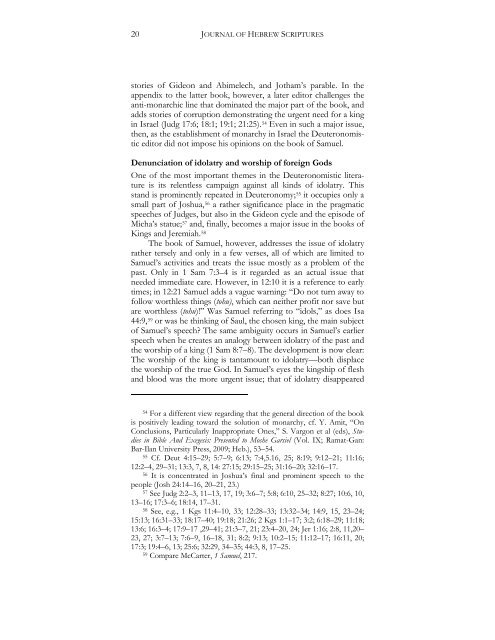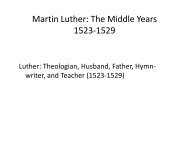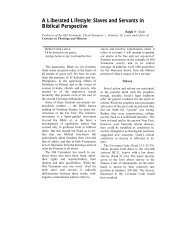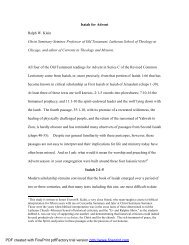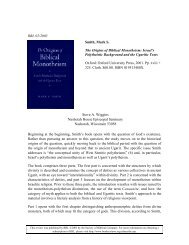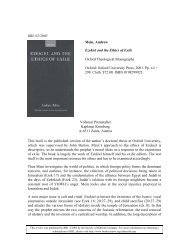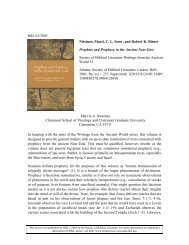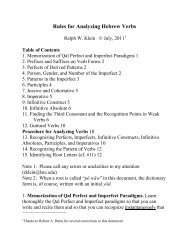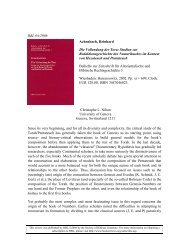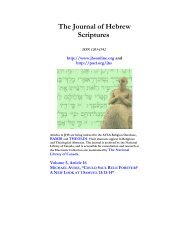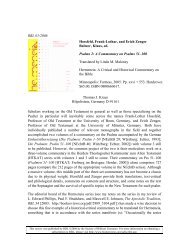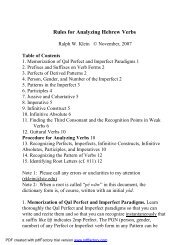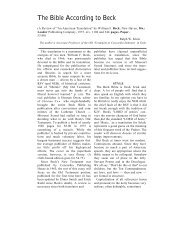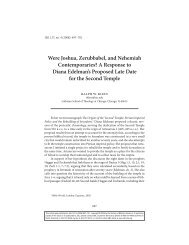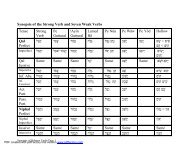The Book of Samuel: Its Composition, Structure and Significance as ...
The Book of Samuel: Its Composition, Structure and Significance as ...
The Book of Samuel: Its Composition, Structure and Significance as ...
You also want an ePaper? Increase the reach of your titles
YUMPU automatically turns print PDFs into web optimized ePapers that Google loves.
20 JOURNAL OF HEBREW SCRIPTURES<br />
stories <strong>of</strong> Gideon <strong>and</strong> Abimelech, <strong>and</strong> Jotham’s parable. In the<br />
appendix to the latter book, however, a later editor challenges the<br />
anti-monarchic line that dominated the major part <strong>of</strong> the book, <strong>and</strong><br />
adds stories <strong>of</strong> corruption demonstrating the urgent need for a king<br />
in Israel (Judg 17:6; 18:1; 19:1; 21:25). 54 Even in such a major issue,<br />
then, <strong>as</strong> the establishment <strong>of</strong> monarchy in Israel the Deuteronomistic<br />
editor did not impose his opinions on the book <strong>of</strong> <strong>Samuel</strong>.<br />
Denunciation <strong>of</strong> idolatry <strong>and</strong> worship <strong>of</strong> foreign Gods<br />
One <strong>of</strong> the most important themes in the Deuteronomistic literature<br />
is its relentless campaign against all kinds <strong>of</strong> idolatry. This<br />
st<strong>and</strong> is prominently repeated in Deuteronomy; 55 it occupies only a<br />
small part <strong>of</strong> Joshua, 56 a rather significance place in the pragmatic<br />
speeches <strong>of</strong> Judges, but also in the Gideon cycle <strong>and</strong> the episode <strong>of</strong><br />
Micha’s statue; 57 <strong>and</strong>, finally, becomes a major issue in the books <strong>of</strong><br />
Kings <strong>and</strong> Jeremiah. 58<br />
<strong>The</strong> book <strong>of</strong> <strong>Samuel</strong>, however, addresses the issue <strong>of</strong> idolatry<br />
rather tersely <strong>and</strong> only in a few verses, all <strong>of</strong> which are limited to<br />
<strong>Samuel</strong>’s activities <strong>and</strong> treats the issue mostly <strong>as</strong> a problem <strong>of</strong> the<br />
p<strong>as</strong>t. Only in 1 Sam 7:3–4 is it regarded <strong>as</strong> an actual issue that<br />
needed immediate care. However, in 12:10 it is a reference to early<br />
times; in 12:21 <strong>Samuel</strong> adds a vague warning: “Do not turn away to<br />
follow worthless things (tohu), which can neither pr<strong>of</strong>it nor save but<br />
are worthless (tohu)!” W<strong>as</strong> <strong>Samuel</strong> referring to “idols,” <strong>as</strong> does Isa<br />
44:9, 59 or w<strong>as</strong> he thinking <strong>of</strong> Saul, the chosen king, the main subject<br />
<strong>of</strong> <strong>Samuel</strong>’s speech? <strong>The</strong> same ambiguity occurs in <strong>Samuel</strong>’s earlier<br />
speech when he creates an analogy between idolatry <strong>of</strong> the p<strong>as</strong>t <strong>and</strong><br />
the worship <strong>of</strong> a king (1 Sam 8:7–8). <strong>The</strong> development is now clear:<br />
<strong>The</strong> worship <strong>of</strong> the king is tantamount to idolatry—both displace<br />
the worship <strong>of</strong> the true God. In <strong>Samuel</strong>’s eyes the kingship <strong>of</strong> flesh<br />
<strong>and</strong> blood w<strong>as</strong> the more urgent issue; that <strong>of</strong> idolatry disappeared<br />
54 For a different view regarding that the general direction <strong>of</strong> the book<br />
is positively leading toward the solution <strong>of</strong> monarchy, cf. Y. Amit, “On<br />
Conclusions, Particularly Inappropriate Ones,” S. Vargon et al (eds), Studies<br />
in Bible And Exegesis: Presented to Moshe Garsiel (Vol. IX; Ramat-Gan:<br />
Bar-Ilan University Press, 2009; Heb.), 53–54.<br />
55 Cf. Deut 4:15–29; 5:7–9; 6:13; 7:4,5.16, 25; 8:19; 9:12–21; 11:16;<br />
12:2–4, 29–31; 13:3, 7, 8, 14: 27:15; 29:15–25; 31:16–20; 32:16–17.<br />
56 It is concentrated in Joshua’s final <strong>and</strong> prominent speech to the<br />
people (Josh 24:14–16, 20–21, 23.)<br />
57 See Judg 2:2–3, 11–13, 17, 19; 3:6–7; 5:8; 6:10, 25–32; 8:27; 10:6, 10,<br />
13–16; 17:3–6; 18:14, 17–31.<br />
58 See, e.g., 1 Kgs 11:4–10, 33; 12:28–33; 13:32–34; 14:9, 15, 23–24;<br />
15:13; 16:31–33; 18:17–40; 19:18; 21:26; 2 Kgs 1:1–17; 3:2; 6:18–29; 11:18;<br />
13:6; 16:3–4; 17:9–17 ,29–41; 21:3–7, 21; 23:4–20, 24; Jer 1:16; 2:8, 11,20–<br />
23, 27; 3:7–13; 7:6–9, 16–18, 31; 8:2; 9:13; 10:2–15; 11:12–17; 16:11, 20;<br />
17:3; 19:4–6, 13; 25:6; 32:29, 34–35; 44:3, 8, 17–25.<br />
59 Compare McCarter, 1 <strong>Samuel</strong>, 217.


